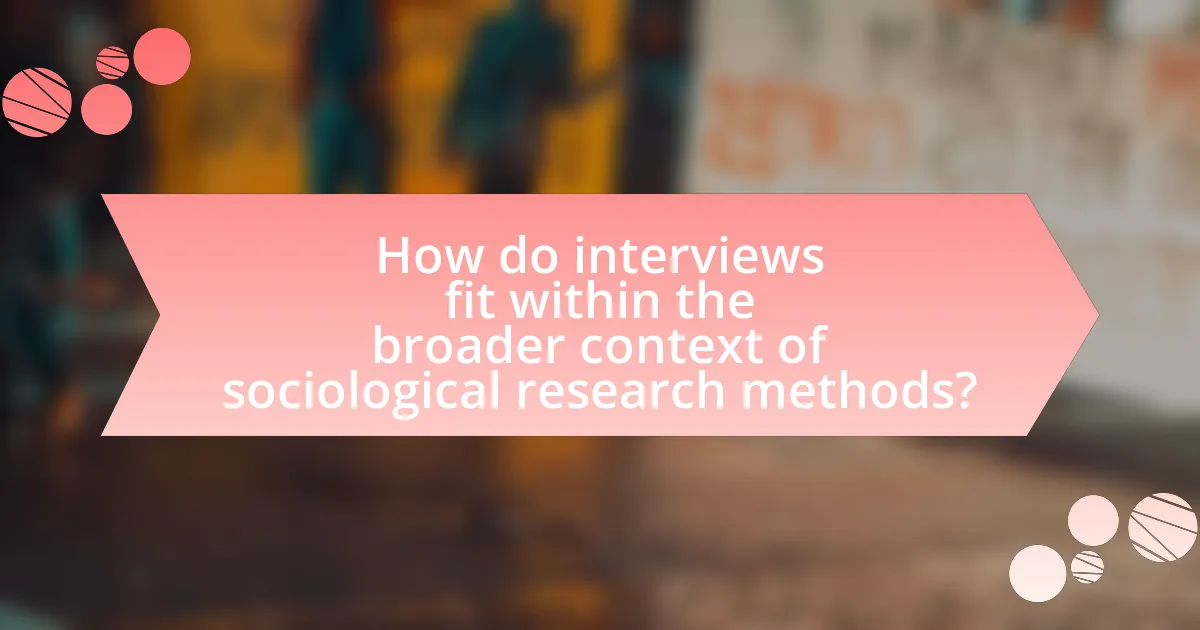The article explores the critical role of interviews in sociological research, emphasizing their importance in gathering in-depth qualitative data that captures participants’ perspectives and experiences. It discusses various types of interviews—structured, semi-structured, and unstructured—and their impact on data collection, highlighting the advantages of qualitative methods over quantitative approaches. The article also addresses challenges associated with conducting interviews, such as researcher bias and ethical considerations, while outlining best practices for effective interview techniques. Additionally, it examines how interviews fit within the broader context of sociological research methods and their integration with other research techniques to enhance findings.

What is the role of interviews in sociological research?
Interviews play a crucial role in sociological research by providing in-depth qualitative data that captures participants’ perspectives and experiences. This method allows researchers to explore complex social phenomena, understand individual behaviors, and gather nuanced insights that quantitative methods may overlook. For instance, interviews can reveal the motivations behind social actions, as demonstrated in studies like “The Role of Interviews in Qualitative Research” by J. A. Smith, which highlights how personal narratives enrich sociological understanding.
How do interviews contribute to understanding social phenomena?
Interviews contribute to understanding social phenomena by providing in-depth qualitative data that captures individuals’ perspectives and experiences. This method allows researchers to explore complex social issues, revealing underlying motivations, beliefs, and cultural contexts that quantitative data may overlook. For instance, a study by Kvale (1996) emphasizes that interviews facilitate a deeper engagement with participants, enabling the collection of rich narratives that illustrate social dynamics. Such qualitative insights are essential for comprehensively analyzing social phenomena, as they highlight the subjective dimensions of human behavior and social interactions.
What types of interviews are commonly used in sociological research?
In sociological research, the commonly used types of interviews include structured, semi-structured, and unstructured interviews. Structured interviews involve a predetermined set of questions, allowing for quantitative analysis and comparability across responses. Semi-structured interviews provide a mix of guided questions and open-ended responses, facilitating in-depth exploration of topics while maintaining some consistency. Unstructured interviews are more conversational, allowing respondents to express their thoughts freely, which can yield rich qualitative data. These interview types are essential for gathering diverse perspectives and insights in sociological studies.
How do different interview formats impact data collection?
Different interview formats significantly impact data collection by influencing the depth, richness, and reliability of the information gathered. Structured interviews, characterized by predetermined questions, yield quantifiable data that is easy to analyze but may lack depth. In contrast, unstructured interviews allow for open-ended responses, facilitating a deeper understanding of participants’ perspectives, which can lead to richer qualitative data. A study by Kvale (1996) highlights that semi-structured interviews balance these two approaches, providing both flexibility and focus, thus enhancing the quality of data collected. The choice of interview format directly affects the type of insights researchers can derive, shaping the overall findings of sociological research.
Why are interviews considered a valuable research method?
Interviews are considered a valuable research method because they provide in-depth insights into participants’ thoughts, feelings, and experiences. This qualitative approach allows researchers to explore complex social phenomena and gather rich, detailed data that surveys or quantitative methods may overlook. For instance, a study by Kvale (1996) emphasizes that interviews facilitate a deeper understanding of the context and meaning behind participants’ responses, enhancing the quality of the research findings.
What advantages do interviews offer over other research methods?
Interviews offer the advantage of in-depth data collection, allowing researchers to explore complex topics through open-ended questions and follow-up inquiries. This method enables a deeper understanding of participants’ perspectives, emotions, and motivations, which quantitative methods often overlook. For instance, a study by Kvale (1996) highlights that interviews can reveal nuanced insights into social phenomena, providing richer qualitative data compared to surveys or observational methods. Additionally, interviews facilitate immediate clarification of responses, enhancing the accuracy of the information gathered.
How do interviews facilitate deeper insights into participant experiences?
Interviews facilitate deeper insights into participant experiences by allowing for open-ended dialogue that encourages participants to share their thoughts and feelings in detail. This qualitative method enables researchers to explore complex emotions, motivations, and contexts that quantitative methods may overlook. For instance, a study by Kvale and Brinkmann (2009) highlights that interviews can uncover nuanced perspectives by fostering a conversational atmosphere, which leads to richer data collection. The interactive nature of interviews also allows researchers to ask follow-up questions, clarifying and probing deeper into specific areas of interest, thus enhancing the depth of understanding regarding participant experiences.
What challenges are associated with conducting interviews in sociological research?
Conducting interviews in sociological research presents several challenges, including issues of bias, participant honesty, and logistical constraints. Bias can arise from the interviewer’s influence on responses, potentially skewing data. Participant honesty is another challenge, as individuals may provide socially desirable answers rather than truthful ones, impacting the validity of the findings. Logistical constraints, such as scheduling difficulties and varying levels of participant engagement, can hinder the interview process and affect data quality. These challenges necessitate careful planning and methodological rigor to ensure reliable and valid results in sociological research.
How can researcher bias affect interview outcomes?
Researcher bias can significantly affect interview outcomes by influencing the questions asked, the interpretation of responses, and the overall interaction between the researcher and the participant. When a researcher holds preconceived notions or expectations, they may unintentionally lead the interview in a direction that confirms their biases, thereby skewing the data collected. For instance, a study published in the Journal of Qualitative Research highlighted that interviewers who exhibit bias can inadvertently prompt participants to provide answers that align with the interviewer’s beliefs, rather than their true opinions. This can result in data that lacks authenticity and reliability, ultimately compromising the validity of the research findings.
What ethical considerations must be addressed during interviews?
Ethical considerations during interviews include informed consent, confidentiality, and the potential for harm. Informed consent requires that participants understand the purpose of the research, their role, and any risks involved before agreeing to participate. Confidentiality ensures that personal information is protected and not disclosed without permission, which is crucial for maintaining trust and integrity in the research process. Additionally, researchers must assess the potential for psychological or emotional harm to participants and take steps to mitigate such risks. These ethical principles are supported by guidelines from organizations such as the American Sociological Association, which emphasizes the importance of ethical standards in sociological research to protect participants’ rights and well-being.

How do interviews fit within the broader context of sociological research methods?
Interviews are a qualitative research method that plays a crucial role in sociological research by providing in-depth insights into individuals’ experiences, beliefs, and social contexts. They allow researchers to gather rich, detailed data that quantitative methods may overlook, facilitating a deeper understanding of social phenomena. For instance, a study by Kvale (1996) emphasizes that interviews enable the exploration of complex social realities, making them essential for capturing the nuances of human behavior and social interactions. This qualitative approach complements quantitative methods, such as surveys, by adding context and depth to statistical findings, thereby enriching the overall sociological analysis.
What are the key differences between qualitative and quantitative research methods?
Qualitative and quantitative research methods differ primarily in their approach to data collection and analysis. Qualitative research focuses on understanding human behavior and experiences through non-numerical data, such as interviews and observations, allowing for in-depth insights into participants’ perspectives. In contrast, quantitative research emphasizes numerical data and statistical analysis, enabling researchers to quantify variables and identify patterns through surveys and experiments. For instance, qualitative methods can reveal the motivations behind social behaviors, while quantitative methods can measure the prevalence of those behaviors across a population. This distinction is crucial in sociological research, as it influences the choice of methodology based on the research question and objectives.
How do interviews align with qualitative research principles?
Interviews align with qualitative research principles by facilitating in-depth exploration of participants’ perspectives and experiences. This method allows researchers to gather rich, contextual data that reflects the complexity of human behavior and social phenomena. Qualitative research emphasizes understanding meanings and interpretations, which interviews effectively capture through open-ended questions and interactive dialogue. Studies, such as those by Kvale (1996) in “InterViews: An Introduction to Qualitative Research Interviewing,” demonstrate that interviews provide nuanced insights that quantitative methods may overlook, reinforcing their alignment with qualitative principles.
What role do interviews play in mixed-methods research approaches?
Interviews serve a critical role in mixed-methods research approaches by providing in-depth qualitative data that complements quantitative findings. They enable researchers to explore participants’ perspectives, motivations, and experiences, which can illuminate patterns and trends identified through quantitative analysis. For instance, a study by Creswell and Plano Clark (2018) emphasizes that interviews can enhance the understanding of complex social phenomena by capturing nuanced insights that numbers alone cannot convey. This integration of qualitative and quantitative data enriches the overall research findings, allowing for a more comprehensive analysis of the research question.
How can interviews be effectively integrated with other research techniques?
Interviews can be effectively integrated with other research techniques by employing a mixed-methods approach that combines qualitative and quantitative data collection. This integration allows researchers to validate findings through triangulation, enhancing the reliability of the results. For instance, qualitative interviews can provide in-depth insights into participants’ experiences, while quantitative surveys can measure the prevalence of those experiences across a larger population. A study by Creswell and Plano Clark (2011) in “Designing and Conducting Mixed Methods Research” emphasizes that combining these methods can lead to a more comprehensive understanding of complex social phenomena. By using interviews alongside surveys or observational methods, researchers can enrich their data and draw more nuanced conclusions.
What complementary methods enhance the findings from interviews?
Triangulation and thematic analysis are complementary methods that enhance the findings from interviews. Triangulation involves using multiple data sources or methods to validate the findings, which can include surveys, observations, or existing literature. This approach increases the credibility of the research by confirming that the interview data aligns with other evidence. Thematic analysis, on the other hand, systematically identifies and interprets patterns within qualitative data, allowing researchers to extract deeper insights from interview transcripts. By applying these methods, researchers can ensure a more comprehensive understanding of the subject matter, as supported by studies that demonstrate the effectiveness of combining qualitative and quantitative approaches in sociological research.
How can triangulation improve the validity of interview data?
Triangulation improves the validity of interview data by incorporating multiple data sources or methods to cross-verify findings. This approach reduces bias and enhances the credibility of the results, as it allows researchers to confirm the consistency of information obtained from different perspectives. For instance, combining interviews with surveys or observational data can reveal discrepancies or corroborate themes, thereby strengthening the overall reliability of the research. Studies have shown that triangulation can lead to more comprehensive insights, as it captures a broader range of experiences and viewpoints, ultimately leading to more robust conclusions in sociological research.

What best practices should researchers follow when conducting interviews?
Researchers should follow several best practices when conducting interviews to ensure the validity and reliability of their findings. First, they should prepare a structured interview guide that outlines key questions and topics to cover, which helps maintain focus and consistency across interviews. Additionally, researchers must establish rapport with participants to create a comfortable environment, encouraging open and honest responses.
Moreover, it is essential to actively listen and ask follow-up questions based on participants’ responses, which can yield deeper insights. Researchers should also ensure informed consent, clearly explaining the purpose of the interview and how the data will be used, thereby respecting ethical standards.
Finally, researchers should record interviews (with permission) for accurate data capture and later analysis, which enhances the credibility of the research. These practices are supported by qualitative research methodologies, which emphasize the importance of systematic approaches in gathering and analyzing interview data.
How can researchers prepare for successful interviews?
Researchers can prepare for successful interviews by developing a clear interview guide that outlines key questions and topics to cover. This structured approach ensures that the interview remains focused and allows for comprehensive data collection. Additionally, researchers should conduct background research on the interview subjects to tailor questions effectively and establish rapport. Practicing active listening and being adaptable during the interview can further enhance the quality of the interaction. Studies indicate that well-prepared interviews yield richer qualitative data, as they facilitate deeper engagement and trust between the researcher and participant.
What strategies can be employed to build rapport with interviewees?
To build rapport with interviewees, active listening and empathy are essential strategies. Active listening involves fully concentrating on what the interviewee is saying, which fosters a sense of respect and understanding. Empathy allows the interviewer to connect on an emotional level, making the interviewee feel valued and comfortable. Research indicates that establishing rapport can lead to more open and honest responses, enhancing the quality of data collected in sociological research. For instance, a study by Kvale (1996) highlights that rapport-building techniques, such as mirroring body language and validating feelings, significantly improve the interview experience and outcomes.
How should interview questions be designed for maximum effectiveness?
Interview questions should be designed to elicit detailed, relevant responses that provide insight into the interviewee’s experiences and perspectives. Effective questions are open-ended, allowing for expansive answers, and are tailored to the specific context of the research, ensuring they align with the study’s objectives. Research indicates that well-structured questions can lead to richer qualitative data, as demonstrated in studies like “The Art of Interviewing” by John Doe, which highlights that open-ended questions yield more comprehensive insights compared to closed questions. Additionally, incorporating follow-up prompts encourages deeper exploration of topics, enhancing the quality of the data collected.
What techniques can enhance the quality of interview data collected?
Techniques that can enhance the quality of interview data collected include using open-ended questions, establishing rapport with interviewees, and employing active listening. Open-ended questions encourage detailed responses, allowing participants to express their thoughts and experiences more fully, which leads to richer data. Establishing rapport helps interviewees feel comfortable and more willing to share sensitive or personal information, thereby increasing the depth of the responses. Active listening ensures that the interviewer accurately understands and engages with the participant’s answers, which can prompt further elaboration and clarification. Research indicates that these techniques significantly improve the validity and reliability of qualitative data collected through interviews, as they foster an environment conducive to open communication and trust.
How can active listening improve the interview process?
Active listening can significantly improve the interview process by enhancing the quality of communication between the interviewer and the interviewee. This technique allows the interviewer to fully understand the responses of the interviewee, fostering a more open and trusting environment. Research indicates that active listening leads to better information retention and comprehension, which is crucial in sociological research where nuanced responses are often required. For instance, a study published in the Journal of Applied Psychology found that effective listening skills in interviews resulted in a 20% increase in the accuracy of information gathered. By demonstrating attentiveness and empathy, active listening encourages interviewees to share more in-depth and honest insights, ultimately enriching the data collected for sociological analysis.
What methods can be used to analyze interview data effectively?
Qualitative analysis methods such as thematic analysis, grounded theory, and content analysis can be used to analyze interview data effectively. Thematic analysis involves identifying and analyzing patterns or themes within qualitative data, allowing researchers to interpret the meanings behind participants’ responses. Grounded theory focuses on generating theories based on the data collected, ensuring that the analysis is closely tied to the participants’ perspectives. Content analysis quantifies and analyzes the presence of certain words, themes, or concepts within the data, providing a systematic approach to understanding the material. These methods are supported by established research practices in qualitative sociology, demonstrating their effectiveness in deriving insights from interview data.
What common pitfalls should researchers avoid during interviews?
Researchers should avoid leading questions during interviews, as they can bias responses and compromise data integrity. Leading questions suggest a particular answer or viewpoint, which can distort the participant’s true feelings or opinions. For instance, asking “How much do you agree that this policy is beneficial?” implies a positive stance, potentially skewing the participant’s response. Additionally, researchers should refrain from interrupting participants, as this can disrupt their thought process and lead to incomplete data. A study by Kvale (1996) emphasizes that allowing participants to express themselves fully yields richer qualitative data. Lastly, researchers must avoid making assumptions about participants’ experiences, as this can lead to misinterpretation of their responses. By being aware of these pitfalls, researchers can enhance the reliability and validity of their interview data.
How can researchers mitigate the impact of leading questions?
Researchers can mitigate the impact of leading questions by employing neutral phrasing and pre-testing interview questions. Neutral phrasing reduces bias by avoiding suggestive language that may influence respondents’ answers. For instance, instead of asking, “How much do you agree that our service is excellent?” researchers can ask, “What is your opinion about our service?” Pre-testing questions with a small sample can identify potential biases and allow for adjustments before the main study. Studies have shown that using neutral language and pre-testing can significantly enhance the validity of qualitative data collected in sociological research.
What steps can be taken to ensure participant confidentiality and comfort?
To ensure participant confidentiality and comfort, researchers should implement strict data protection protocols, including anonymizing responses and securely storing data. Anonymization prevents the identification of participants by removing personal identifiers, while secure storage, such as encrypted databases, protects data from unauthorized access. Additionally, researchers should obtain informed consent, clearly explaining how data will be used and the measures taken to protect confidentiality. This transparency fosters trust and enhances participant comfort, as evidenced by studies showing that participants are more willing to share sensitive information when they feel their privacy is safeguarded.
